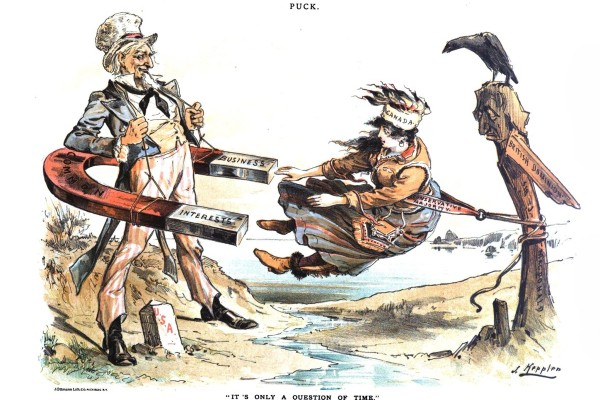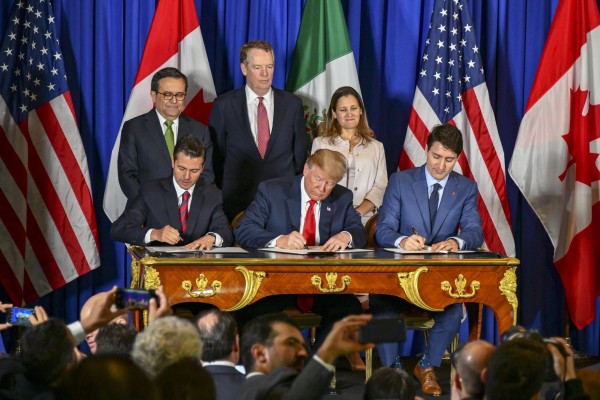-

Canada needs an industrial strategy that serves public goods, not corporate interests
Diversifying Canada’s economic strategy is essential in an era of tariff escalation and growing geopolitical volatility. Stellantis’s recent announcement that it’s heading south sent another Arctic chill to concerns over Canada’s industrial future. Billions in public subsidies are flowing to foreign multinational automakers, yet questions remain: Who benefits?
-
_600_400_90_s_c1.jpg)
What is BRICS and where is it going?
The success of the BRICS project does not signal an overthrow of capitalism as a global system, but it does mark a shift away from Western dominance. It reflects a broader push for greater national sovereignty among countries in the Global South. The 2025 BRICS summit underscored that the center of gravity in the global economy is moving steadily southward.
-
_600_400_90_s_c1.jpg)
Could a Trump-driven trade crisis spur us to rethink economic growth?
Now that economic rethinking is on the agenda, argues Richard Swift, it’s a good time for those who see the ominous writing on the wall to challenge the growth consensus and promote a package of serious degrowth measures, some of which align with historic left demands and the Green New Deal which seems to have faded from view.
-

The world according to Trump
As the US redefines its global role and its approach to international relations with Trump at the helm, the world is going to become a far more unstable and threatening place than it already is. In this enormously challenging context, the pivotal but still uncertain question will be the scale and strength of working class resistance and the popular struggles that are taken up.
-

Germany’s new right: Trading on nostalgia for past prosperity in an age of uncertainty
This long-read offers a different explanation for the hard-right surge in Germany. It shows that German unification in 1990, signalling the triumph of liberal democracy and the onset of neoliberal globalization, unleashed a new form of nationalism—Deutschmark nationalism—which, after mutating into export nationalism for a while, became the ideological seed for the AfD.
-

No more middle road
There is no way for the moderate, left-of-centre approach to work within the larger neoliberal world economy. Unless the latter is subverted, or challenged with a new political project, the kinds of alternatives proposed in Andrew Jackson and Scott Sinclair’s article (including an expanded social safety net and caring sector) cannot come to be.
-
_600_400_90_s_c1.jpg)
Canada and the new world disorder
It has been almost 40 years since there was major debate in Canada about our relations with the United States. While the FTA was implemented after the 1988 election, a majority of voters supported a more active role by governments in shaping economic development. Today we are confronted with the very serious probability that the free trade era has come to an end.
-

‘The green transition is a myth’: Adam Hanieh on the ongoing centrality of oil to capitalism
Many vital left-wing books about global oil politics have been published over the last decade: Mazen Labban’s Space, Oil and Capital, Timothy Mitchell’s Carbon Democracy, and Simon Pirani’s Burning Up. Perhaps none have provided quite as sweeping and synthetic of an analysis as Adam Hanieh’s Crude Capitalism: Oil, Corporate Power, and the Making of the World Market.
-

Brett Christophers on our growing ‘asset-manager society’
As geographer Brett Christophers shows, many people now live in homes and rely on infrastructure like toll roads, hospitals, gas pipelines, data centres, water and sanitation services, telecom towers, and electricity generation facilities that are ultimately owned by pension funds, insurance companies, and banks through highly complex asset management schemes.
-

Taming Amazon, renewing labour
The Amazon organizing model poses three tests for labour and the left. Can traditional unionism bring power to Amazon workers and if not, what kind of trade unionism might? Can the struggle at Amazon contribute to transforming the labour movement? And are unions adequate to confronting modern capitalism or do they need to be supplemented by other forms of organization?



